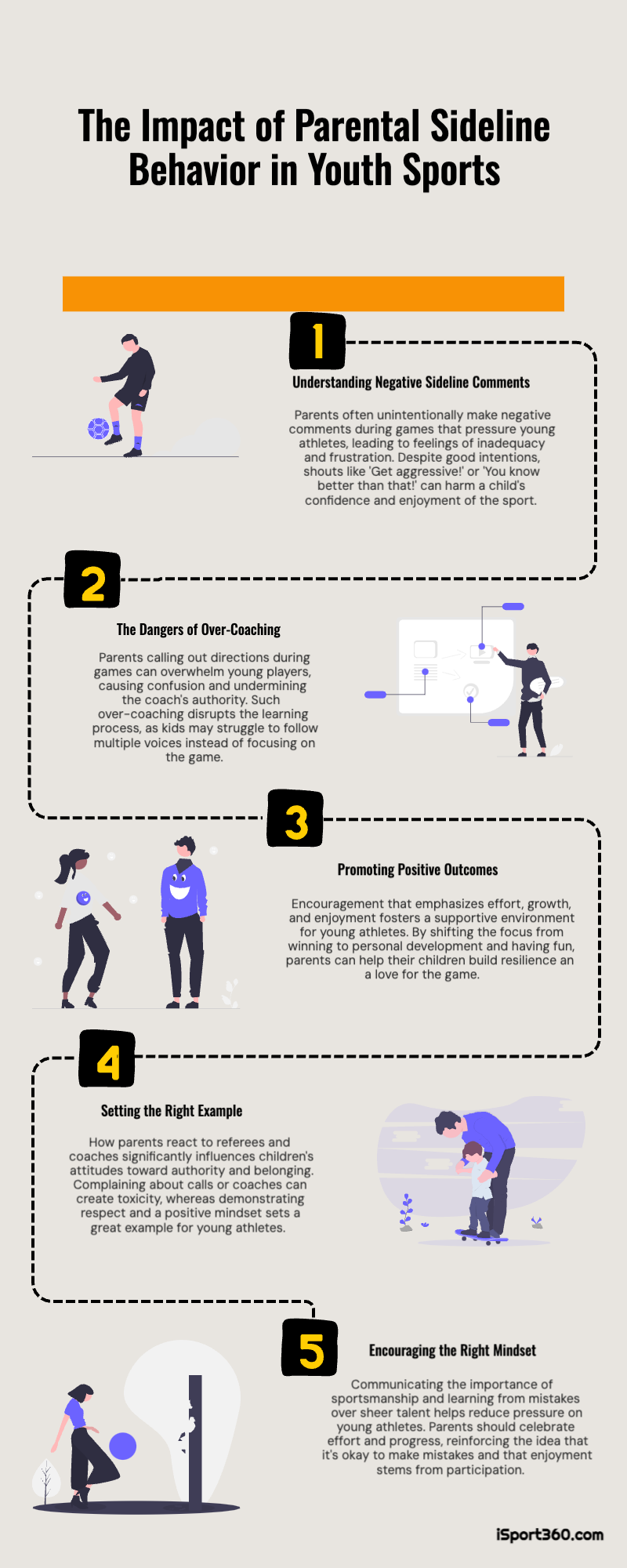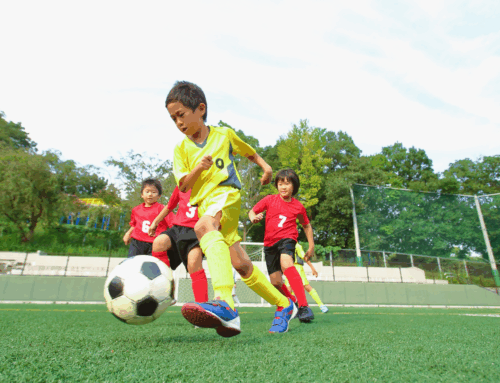Get our exclusive report. Download the iSport360 Club Switching Report Here – For Club Admins, Rec Leaders and Coaches.
What Youth Sports Parents Say on the Sidelines
If you’ve ever been to a youth sports game, you know the sidelines can be just as lively as the game itself. Parents cheer, shout, and offer words of encouragement. But not all the comments made on the sidelines are as positive as parents might intend. While most parents want the best for their kids, some sideline chatter can create pressure, cause distractions, or even harm the experience for young athletes. Let’s look at some common things parents say on the sidelines and why these comments, despite good intentions, might be doing more harm than good.

1. “Get aggressive!” or “Go harder!”
Many parents want to see their kids play with intensity and drive, which can be a great quality in sports. But shouting instructions like “Get aggressive!” or “Go harder!” can lead to unintended consequences. Some young athletes interpret these commands as permission to play recklessly or even engage in dangerous play, potentially putting themselves or others at risk. Moreover, constant directives about “playing harder” can give kids the impression that their natural effort isn’t good enough, leading to feelings of inadequacy and frustration.
A Better Approach: Encourage resilience and tenacity without prescribing aggression. Support your child’s unique playing style, and let coaches handle the specifics of intensity and technique.
2. “Come on, you know better than that!”
Mistakes are part of the learning process, but some parents express their frustration with comments like, “You know better than that!” While it might seem like a gentle nudge to stay focused, this kind of comment can lead kids to feel shame or embarrassment, especially in front of their teammates and spectators. Over time, kids who frequently hear criticism on the sidelines may become hesitant, more focused on avoiding mistakes than playing confidently.
A Better Approach: Acknowledge mistakes as part of learning. Replace criticism with phrases like, “Shake it off, you’ll get it next time!” which encourages resilience without undermining confidence.
3. “Pass it! Shoot! Go left!”
While sideline coaching might seem helpful, it often distracts players and causes confusion. Kids in the middle of a game are already trying to follow their coach’s instructions and stay aware of the action. When parents start calling out directions, it can overwhelm young athletes, leaving them uncertain about who to listen to and where to focus. This “over-coaching” also undermines the coach’s authority, leading to frustration and inconsistency on the field.
A Better Approach: Allow your child to play without micromanaging their every move. Trust the coaches, and let kids learn to make decisions in real-time.
4. “Ref, are you kidding me?”
Few things ramp up sideline tension like disputing calls with the officials. When parents loudly question a ref’s call, they’re setting an example for their kids — and it’s not a good one. Complaining about officiating teaches kids to deflect responsibility and fosters an atmosphere of negativity. It can also intimidate or upset young officials, many of whom are learning the job themselves. And it’s a sure way to escalate tension on the field.
A Better Approach: Model respect for authority by accepting the ref’s calls, even if they seem unfair. This sets an example for kids to focus on their play, not factors outside of their control.
5. “You’re the best out there!” or “They’re not as good as you.”
This kind of praise seems positive, but it can set up unrealistic expectations. If kids believe they are the “best,” they may feel extra pressure to live up to this label and become discouraged if they fall short. Additionally, comparisons to other players can foster arrogance, strain friendships, or make kids feel alienated from their teammates.
A Better Approach: Recognize effort, sportsmanship, and growth over talent alone. Say things like, “You worked hard out there!” or “I’m proud of how you played,” which emphasizes effort over comparisons.
6. “Don’t worry, the coach doesn’t know what they’re doing.”
Sometimes, parents disagree with a coach’s strategy or decisions and make those feelings known to their child. While voicing frustration is natural, criticizing a coach in front of a child can harm the player-coach relationship and undermine the team dynamic. Kids who hear negative comments about their coach may struggle to respect them or feel reluctant to follow their guidance.
A Better Approach: If you have concerns, discuss them privately with the coach rather than in front of your child. Show your child how to navigate disagreements respectfully.
7. “You need to win this!”
Winning can be a wonderful goal, but overemphasizing it can make kids feel like the only thing that matters is the outcome, not the process. Kids who internalize this message may struggle to enjoy the game or feel immense pressure to win at all costs. This win-at-all-costs mentality can diminish their love for the sport and create unnecessary stress.
A Better Approach: Shift the focus from winning to effort, improvement, and enjoyment. Try saying, “Play your best and have fun,” which shows that you value their experience, not just the outcome.
The Impact of Positive Sideline Behavior
A parent’s behavior on the sidelines profoundly impacts young athletes’ enjoyment of the game, development, and self-confidence. Positive comments that focus on effort, growth, and respect create a supportive environment where kids feel safe to learn and make mistakes. When parents let kids play without a constant stream of feedback, children can become more resilient, confident, and genuinely engaged in the sport.
Wrap Up
Youth sports are a valuable learning experience that offers lessons in teamwork, resilience, and personal growth. Parents play a critical role in shaping that experience, and while it’s natural to want to help, sometimes the best support is simply being there, cheering them on with positivity. Let the coaches coach, trust the refs, and encourage your child to have fun, learn, and grow. After all, the ultimate goal of youth sports is to develop not only skilled athletes but well-rounded, confident individuals who love the game.
iSport360 is the only app that does it all for youth sports. For more information on what we do, click here.
About the author:
Amy Masters is a sports mom, coach, and club administrator. She has been coaching youth sports for more than 10 years. She started Jr Lions Field Hockey, the youth recreation program for the Hunterdon County community growing it from 40 players in year 1 to 150 players by year 3. A few years later, she saw the love and competitiveness grow then started Omega Field Hockey Club serving NJ and PA players. Before coaching, she was a collegiate field hockey player for Lock Haven University. In her spare time (lol), she is head of marketing for iSport360 and the co-editor of the Youth Sports Survival Guide. The Youth Sports Survival Guide is the largest youth sports newsletter in the world.
Learn more or request a demo of our youth sports software that is helping teams improve communication, organization and player development.
December 11, 2024





